The BurundiNational Defence Force is the state military organisation responsible for the defence of Burundi.

Burundi originated in the 16th century as a small kingdom in the African Great Lakes region. After European contact, it was united with the Kingdom of Rwanda, becoming the colony of Ruanda-Urundi - first colonised by Germany and then by Belgium. The colony gained independence in 1962, and split once again into Rwanda and Burundi. It is one of the few countries in Africa to be a direct territorial continuation of a pre-colonial era African state.
The Hutu, also known as the Abahutu, are a Bantu ethnic group which is native to the African Great Lakes region. They mainly live in Rwanda, Burundi, and Uganda where they form one of the principal ethnic groups alongside the Tutsi and the Great Lakes Twa.
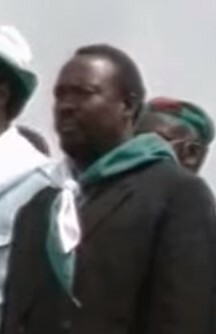
Cyprien Ntaryamira was a Burundian politician who served as President of Burundi from 5 February 1994 until his death two months later. A Hutu born in Burundi, Ntaryamira studied there before fleeing to Rwanda to avoid ethnic violence and complete his education. Active in a Burundian student movement, he cofounded the socialist Burundi Workers' Party and earned an agricultural degree. In 1983, he returned to Burundi and worked agricultural jobs, though he was briefly detained as a political prisoner. In 1986 he cofounded the Front for Democracy in Burundi (FRODEBU), and in 1993 FRODEBU won Burundi's general elections. He subsequently became the Minister of Agriculture and Animal Husbandry on 10 July, but in October Tutsi soldiers killed the president and other top officials in an attempted coup.

The United Nations Assistance Mission for Rwanda (UNAMIR) was established by United Nations Security Council Resolution 872 on 5 October 1993. It was intended to assist in the implementation of the Arusha Accords, signed on 4 August 1993, which was meant to end the Rwandan Civil War. The mission lasted from October 1993 to March 1996. Its activities were meant to aid the peace process between the Hutu-dominated Rwandese government and the Tutsi-dominated rebel Rwandan Patriotic Front (RPF). The UNAMIR has received much attention for its role in failing, due to the limitations of its rules of engagement, to prevent the Rwandan genocide and outbreak of fighting. Its mandate extended past the RPF overthrow of the government and into the Great Lakes refugee crisis. The mission is thus regarded as a major failure.

Pierre Buyoya was a Burundian army officer and politician who served two terms as President of Burundi in 1987 to 1993 and 1996 to 2003. He was the second-longest-serving president in Burundian history.
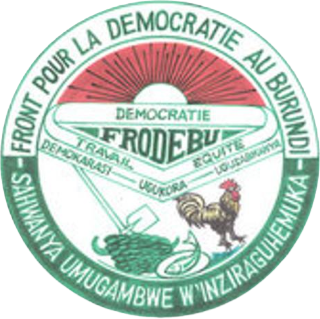
The Front for Democracy in Burundi is a political party in Burundi.

Sylvestre Ntibantunganya is a Burundian politician. He was President of the National Assembly of Burundi from 23 December 1993 to 30 September 1994, and President of Burundi from 6 April 1994 to 25 July 1996.
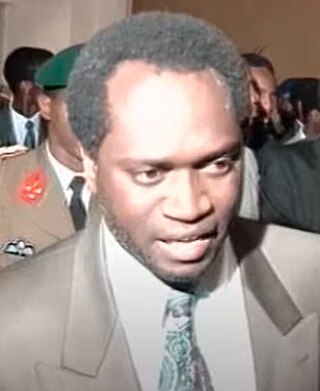
Melchior Ndadaye was a Burundian banker and politician who became the first democratically elected and first Hutu president of Burundi after winning the landmark 1993 election. Though he attempted to smooth the country's bitter ethnic divide, his reforms antagonised soldiers in the Tutsi-dominated army, and he was assassinated amidst a failed military coup in October 1993, after only three months in office. His assassination sparked an array of brutal tit-for-tat massacres between the Tutsi and Hutu ethnic groups, and ultimately led to the decade-long Burundi Civil War.

The Burundian Civil War was a civil war in Burundi lasting from 1993 to 2005. The civil war was the result of longstanding ethnic divisions between the Hutu and the Tutsi ethnic groups. The conflict began following the first multi-party elections in the country since its independence from Belgium in 1962, and is seen as formally ending with the swearing-in of President Pierre Nkurunziza in August 2005. Children were widely used by both sides in the war. The estimated death toll stands at 300,000.

Sylvie Kinigi is a Burundian politician and economist who served as prime minister of Burundi from 10 July 1993 to 7 February 1994, and acting president from November 1993 to 5 February 1994, making her the second African woman to serve as a president.

Mass killings of Tutsis were conducted by the majority-Hutu populace in Burundi from 21 October to December 1993, under an eruption of ethnic animosity and riots following the assassination of Burundian President Melchior Ndadaye in an attempted coup d'état. The massacres took place in all provinces apart from Makamba and Bururi, and were primarily undertaken by Hutu peasants. At many points throughout, Tutsis took vengeance and initiated massacres in response.
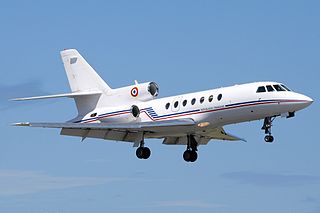
On the evening of 6 April 1994, the aircraft carrying Rwandan president Juvénal Habyarimana and Burundian president Cyprien Ntaryamira, both Hutu, was shot down with surface-to-air missiles as their jet prepared to land in Kigali, Rwanda; both were killed. The assassination set in motion the Rwandan genocide, one of the bloodiest events of the late 20th century.
These are some of the articles related to Burundi on the English Wikipedia:

United Nations Security Council resolution 912, adopted unanimously on 21 April 1994, after reaffirming all resolutions on the situation in Rwanda, particularly resolutions 872 (1993) and 909 (1994), the council expressed its alarm and condemnation of the large-scale violence in the country which resulted in the death of thousands of innocent civilians, and proposed a revised mandate of the United Nations Assistance Mission for Rwanda (UNAMIR).

United Nations Security Council resolution 918 was adopted without a vote on 17 May 1994. After reaffirming all resolutions on the situation in Rwanda, particularly resolutions 872 (1993), 909 (1994) and 912 (1994), the Council expressed its alarm and condemnation at the continuing large-scale violence, and went on to impose an arms embargo on the country and authorise an expansion of the United Nations Assistance Mission for Rwanda (UNAMIR).

United Nations Security Council resolution 1049, adopted unanimously on 5 March 1996, after reaffirming Resolution 1040 (1996) concerning Burundi, the Council called for an end to violence in the country and discussed preparations for a conference on security in the African Great Lakes region.
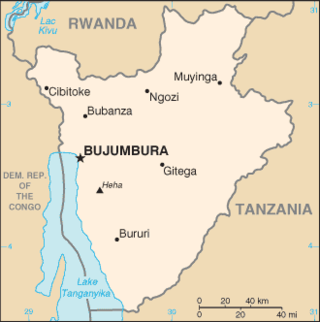
The 1996 Burundian coup d'état was a military coup d'état that took place in Burundi on 25 July 1996. In the midst of the Burundi Civil War, former president Pierre Buyoya deposed Hutu President Sylvestre Ntibantunganya. According to Amnesty International, in the weeks following the coup, more than 6,000 people were killed in the country. This was Buyoya's second successful coup, having overthrown Jean-Baptiste Bagaza in 1987.

On 21 October 1993, a coup was attempted in Burundi by a Tutsi–dominated army faction. The coup attempt resulted in assassination of Hutu President Melchior Ndadaye and the deaths of other officials in the constitutional line of presidential succession. François Ngeze was presented as the new President of Burundi by the army, but the coup failed under domestic and international pressure, leaving Prime Minister Sylvie Kinigi in charge of the government.

Relations between Burundi and Rwanda have existed for at least as long as the states themselves. Before contact with Europeans, Rwanda and Burundi were kingdoms competing to gain control over nearby territory. In the 1880s, the two kingdoms were placed under colonial authority, first by Germany, and then by Belgium after 1919.
















